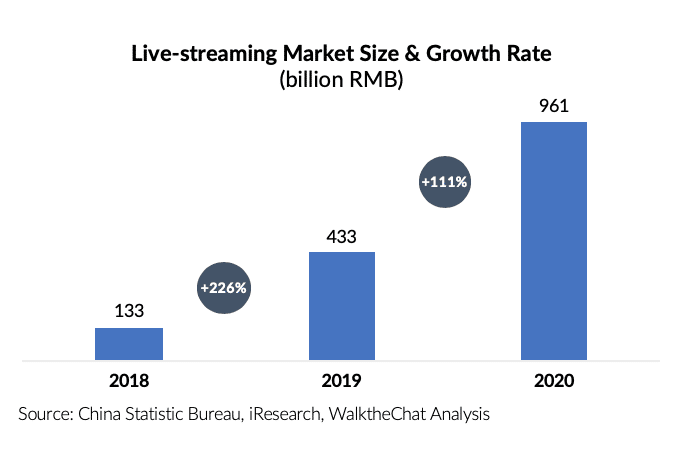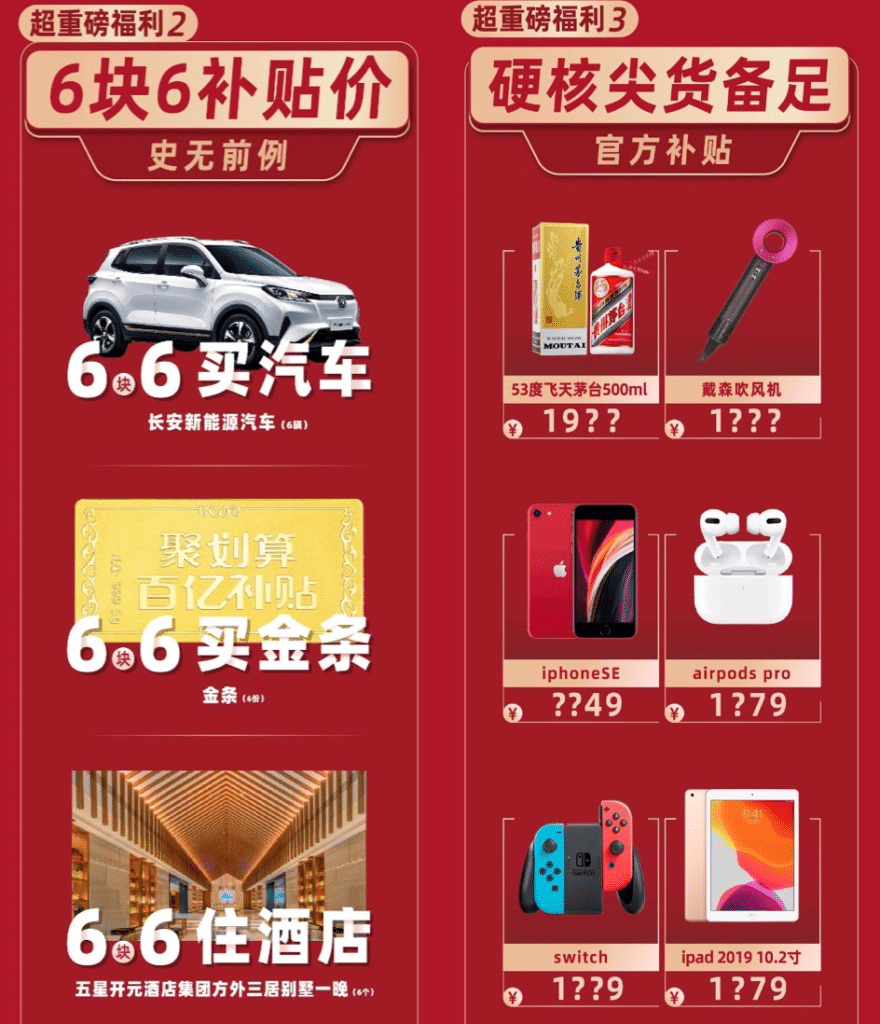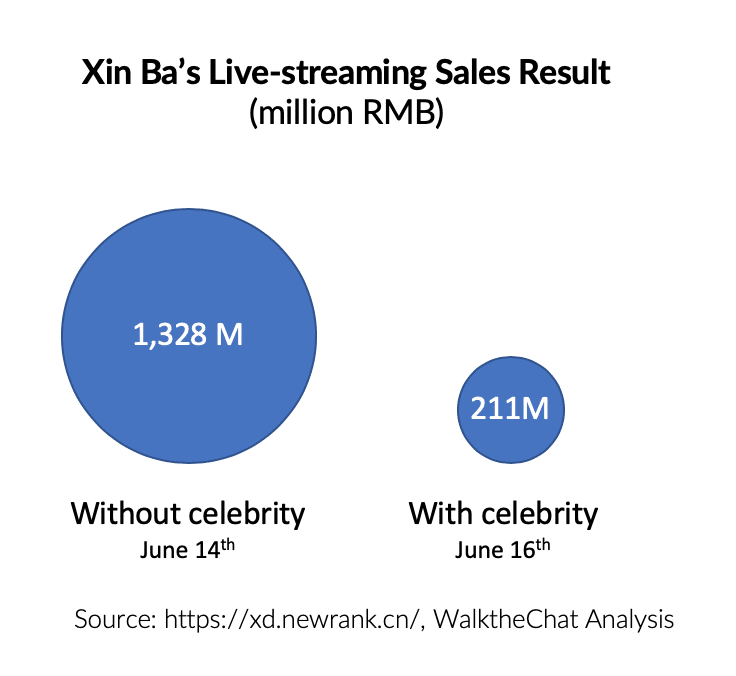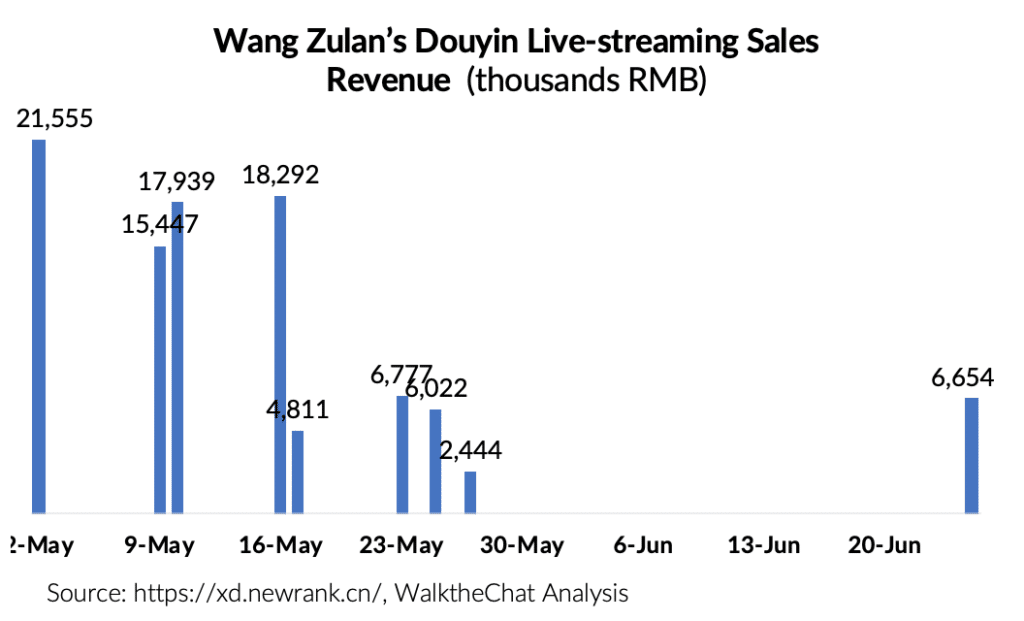- Zhang Yuqi & Xin Ba – 223 million RMB sales on a Kuaishou live-streaming
- Zhang Ting – 256 million RMB sales during her first Douyin live-streaming
- Liu Tao – 148 million RMB sales during her first Taobao live-streaming
These record-breaking data reports show that Chinese celebrities are also becoming live-streaming superstars.
Live-streaming overview
According to the China Statistic Bureau and iResearch, Chinese live-streaming sales will reach 961 billion RMB in 2020, accounting for 4.1% of overall e-commerce sales.

According to CNNIC, the total amount of live-streaming users reaches 560 million in China. That’s around 40% of the total Chinese population.
In the past shopping holiday on June 18th, Alibaba invited over 300 celebrities to host live-streaming, while JD solicited 100 celebrities.

Celebrity’s live-streaming cost for brands
Usually, live-streamers charge a combination of fixed fees and commission. Depending on the size of the influencer, the fixed fee might be between 100k to 500k RMB. The branding effect definitely inflated the fixed fee.
The commission is usually similar to a typical KOL campaign, often around 20%-35% depending on the product category.
On top of the fee, brands also need to sacrifice their margin. Many live-streaming contracts include a lowest-price-guarantee clause to ensure the attractiveness of the live-streaming deal.
Inventory is also a relevant concern. For example, according to IT Time, the team of Wang Zulan (22 million Douyin followers) requires a brand to reserve at least 50k inventory volume exclusively for Wang’s live-streaming campaigns. If the campaign underperforms, it’s a massive hit for the brand that prepared this excess inventory.
Performance
Record-breaking campaigns are praised in PR articles, but most celebrities will not publicly release sales data.
Liu Tao
Liu Tao, a tier-one actor with 44 million Weibo followers, was selected as the official live-streaming ambassador of Alibaba.
Her first live-streaming campaign on Taobao recorded 148 million RMB in sales. And it didn’t end there. Her June 18th campaign created a new record of 220 million RMB sales records.
Liu Tao even sold 10 apartments priced between 3 to 5 million RMB in merely 10 seconds.
Is such a result a glimpse into the booming Chinese e-commerce market and power of tier 1 celebrities? Maybe. These results, however, come at the cost of substantial subsidies from the brand and the platform.
The June 18th campaign claimed to sell 100k products at the price of 0.01 RMB, as part of the Alibaba 10 billion RMB subsidy campaign. Other eye-catching promotions included electric cars, gold strips, and nights in 5-star hotels all discounted at 6.6 RMB. Although limited in quantity, these prices are the best marketing bait to draw viewers.

The apartment campaign even claimed a 3.6 million RMB subsidy. Selling out rooms in 10-seconds became a branding campaign for the property developers.

On top of subsidies, Taobao actively distributes traffic via pop-up ads.

Calculating the ROI of such a campaign is difficult without having clear visibility on the amount of free traffic and subsidies provided by Taobao to support these campaigns.
Zhang Yuqi & Xin Ba
Xin Ba is the No. 1 ranked Kuaishou live-streaming KOL. On June 14th, he broke the 1.3 billion RMB sales record. The top-selling product by sales volume were:
- 2,999 RMB massage sofa, sales revenue was 146 million RMB
- 1,149 RMB skincare set, sales revenue was 145 million RMB
- 1,380 RMB water purifier, sales revenue was 137 million RMB
(Data: NEWRANK)
The high price items are unexpected from a Kuaishou live-streaming, where generally, top-selling items are usually within 50 RMB.
On June 16th, Zhang Yuqi, an actor with 10 million Weibo followers, joined as a celebrity guest to assist in selling premium products such as iPhone 11 and B&O headphones.
The live-streaming with Zhang was successful and created 212 million RMB in total sales. The iPhone 11 was the top-selling product, sold at 4,599 RMB (a 1400 RMB discount), and reached a sales revenue of 38 million RMB.

However, the sales revenue from Zhang’s campaign was still 5 times smaller compared to the June 14th’s campaign.
Behind all the record-breaking sales numbers, it’s tough to tell what’s the real drive of the live-streaming sales. Celebrity support is often not the main reason for the conversion, the amount of traffic distributed by the platform, investment in display ads, and subsidies from the platform and brands are often the critical drive.
Inconsistent results
Lots of celebrities can create record-breaking sales results during their first live-streaming campaign, while others flunked according to NEWRANK.
For example, Yang Di (13 million Douyin followers) ‘s latest live-streaming sales lasted 1 hour but only generated 16k RMB in sales.
Wang Zulan (22 million Douyin follower), after a record-high live-streaming sales of 21 million RMB, is seeing a steady decrease of performance. His latest campaign generated only 6.7 million RMB in sales.

Conclusion
In most cases, celebrity live-streaming campaigns are not a magical solution to boost a brand’s sales. Without clear support from the platform in terms of both traffic and subsidies, they can be a complete gamble.
Such campaigns are, however, heavily publicized, and generate a large amount of views and PR value. Although they might not always be profitable, celebrity endorsements through live-streaming are sometimes what a brand needs to bring China sales to the next level.

